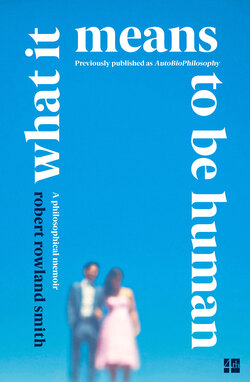Читать книгу What it Means to be Human - Robert Rowland Smith - Страница 35
The future of the past
ОглавлениеEach one of us represents a bet placed by the species in the interests of multiplying itself. Not all the bets will come off: that’s what makes them bets. And yet every one of us is living proof of a bet that did. We leave behind a cloud of countless lives that never came to be, like a trillion soap bubbles popping in the air. We, the few, got life. They, the many, did not. For as long as we are alive, we keep life itself alive. That is perhaps the deepest vocation that we can follow. Without our lives to bear it like a flame, human life itself would expire. Say we achieve little success personally; or fail to love our family as much as we could; or make a negligible contribution to society. Nevertheless we will have kept life alive, and that is not nothing.
As far as furthering the human race is concerned, the brute fact is that those of us without children represent an end-stop. But we can look down the telescope the other way. To be here implies having come from somewhere. The life force has flowed into everyone, regardless of whether it flows out into the next generation. We are ancestral creatures one and all. Typically, we will look back as far as our grandparents or great-grandparents; we will hold three or four generations in mind. Our ancestors are active in us from roughly a hundred years back. They animate our memories even if they no longer move in the world. They enjoy an afterlife during which their name, whenever it is recalled, will swivel like a weathervane in the minds of those who survive them. In this sense, our ancestors don’t finally die until the fourth or fifth generation after them has arrived.
That sounds like a stretch, although in ancestral terms it’s nary a dot on the timeline. Our ancestors extend back for hundreds if not thousands of generations. There isn’t one of us who is not descended from real people who lived in the eighteenth century, the eleventh, the fifth. We have hind-parents from the time of Muhammad, Jesus, Buddha, the Pharaohs, the builders of Stonehenge and before. Hind-parents are people who lived at the same time as those iconic figures, and who placed their children on a serpentine line that eventually found its way to us. Before they were people, they were apes; before they were apes, they were birds; before they were birds, they were fish; and so on, back to the flickering origin of life itself. Thanks to the DNA that was passed down, we hold that line in our bodies. We are the past from which we have come.
The majority that do have children are prolonging the being of their remotest ancestors. It works like an ancient yeast, this thing called ‘being’, a germ with the miraculous power of regeneration. Not that this wonder-culture is any vaccine against death. Even as our children keep a trace of us going, we die. Their arrival signals our departure, no matter how drawn out. Obviously, people without children are mortal too. It’s just that, with an extra generational layer beneath them, parents may find their mortality more clearly framed. The clock doesn’t tick any faster for parents than for non-parents, but perhaps it ticks louder.
In my case, there was a twist. Let us run with the hypothesis that, by becoming a father, I was replacing my own father. In doing so, I was also giving life to my own future replacement, in other words the baby. I made myself both vital and redundant at a stroke. Hardly the action of a genius. Really, all I needed to do was to love my father for who he was, rather than wishing he were someone else. Trying to change their parents is one of the most futile pastimes in which children can indulge. If only I had learned that lesson earlier. I might have spared myself those psychological contortions.
But had I done so, there might never have been any Anna, the daughter who began life in the womb as Sweet Pea. Not to mention my second daughter, Ruby, and my third daughter, Greta. They arrived in 1991 and 2006 respectively, as if fulfilling a prophecy.
The dream revealed nothing, however, about that fifteen-year gap, nor the fact that the daughters would have different mothers. In this respect, the dream was a riddle, not unlike the witches’ prophecy in Shakespeare’s Macbeth.fn4 In Act One, the witches tell Macbeth that he will never be killed by a man ‘of woman born’. From this information, Macbeth quite reasonably infers that he is invulnerable to murder. In Act Five, Macbeth is stabbed by Macduff. It turns out that as a baby Macduff was delivered by Caesarian section. He was never ‘born’ in the technical sense. The prophecy was playing with Macbeth’s assumptions, just as my dream had tricked me into assuming that all three daughters would share the same mother.
